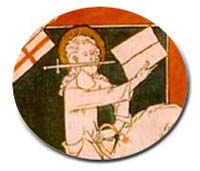 |
Forgotten Truths
By Subverting Traditional Ceremonies,
a Pope Falls into Schism
Following the same rationale regarding last week's excerpt, TIA continues to post the opinions of some of famous theologians on the possibility of a Pope falling into schism.
Today, we bring to our readers a text on this topic by Fr. Francisco Suarez, SJ, one of the greatest Catholic theologians after St. Thomas Aquinas.
Fr. Francisco Suarez (1548-1617)
“Schism may come about not only by reason of heresy, but also without it, as it takes place when someone, conserving the faith, does not wish to maintain the unity of the Church in his actions and his manner of practicing our religion. And this may come about in two ways.
“In the first way, separating oneself from the head of the Church, as one reads in the chapter Non Vos, 23, question 5, in which the Gloss says that schism consists in not having the Roman Pontiff as one’s head – and not in denying that the Roman Pontiff is the head of the Church, for this would be schism united to heresy. Rather, it is either rashly denying some Pontiff in particular, or behaving in relation to him as if he were not the head: for example if someone were to try to convoke a General Council without his authorization, or elect an anti-pope. This is the most common mode of schism.
“There could be a second mode of schism if someone separated himself from the body of the Church not wishing to communicate with it in the participation of the Sacraments. Saint Epiphanius narrates an example of this (Haeres., 68), in respect to the sect of Melecius, who, dissented with his Patriarch, Peter of Alexandrine, separated himself from him in al the sacrifices, and was accused of schism, although between the two there was not any divergence in matters of faith, as Epiphanius attests.
And in this second way, the Pope could be schismatic should he not want to have the due union and coordination with the whole body of the Church, as would be the case if he tried to excommunicate the whole Church, or if he wanted to subvert all the ecclesiastical ceremonies founded on apostolic tradition, as was observed by Cajetan (ad II-II, q. 39) and, with greater amplitude, by Torquemada (1. 4, c.11)” (1).

(Arnaldo V.X. Silveira, The Theological Hypothesis of a Heretic Pope,
available
here, p. 179)
Posted on August 21, 2021



Related Topics of Interest
 By Departing from Traditional Worship,
a Pope Falls into Schism By Departing from Traditional Worship,
a Pope Falls into Schism
 How a Catholic Should Act Before Bad Popes How a Catholic Should Act Before Bad Popes
 When Does a Heretical Pope Become an Invalid Pope? When Does a Heretical Pope Become an Invalid Pope?
 Can a Pope Err in Doctrinal, Liturgical & Canonical Matters? Can a Pope Err in Doctrinal, Liturgical & Canonical Matters?
 The New Mass - A Flavor of Protestantism The New Mass - A Flavor of Protestantism
 Quo Primum vs. Novus Ordo Quo Primum vs. Novus Ordo
 Declaration of Resistance to the Vatican
Ostpolitik Declaration of Resistance to the Vatican
Ostpolitik
 Resisting the Novelties of the Conciliar Church Resisting the Novelties of the Conciliar Church
 The Novus Ordo Mass Broke the Identity of the Church The Novus Ordo Mass Broke the Identity of the Church

Related Works of Interest
|
Forgotten Truths | Religious | Home | Books | CDs | Search | Contact Us | Donate

© 2002-
Tradition in Action, Inc. All Rights Reserved
|
 |
|